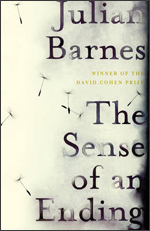| |
2010s |
| |
The Art of Fielding, Chad Harbach
Beautiful Ruins, Jess Walter
Dead Stars, Bruce Wagner
Dept. of Speculation, Jenny Offill
The Devil All the Time, Donald Ray Pollock
Freedom, Jonathan Franzen
The Goldfinch, Donna Tartt
Hallucinations, Oliver Sacks
The Immortal Life of Henrietta Lacks, Rebecca Skloot
The Imperfectionists, Tom Rachman
The Interestings, Meg Wolitzer
The Maid’s Version, Daniel Woodrell
Mortality, Christopher Hitchens
The Sense of an Ending, Julian Barnes
The Sixth Extinction: An Unnatural History, Elizabeth Kolbert
The Snow Queen, Michael Cunningham
A Visit from the Goon Squad, Jennifer Egan
We Are Not Ourselves, Matthew Thomas
We the Animals, Justin Torres
What You See in the Dark, Manuel Muñoz
The Woman Upstairs, Claire Messud |
|
|
The Sense of an Ending, Julian Barnes
Jonathan Cape, August 4, 2011
This was another of our fears: that Life wouldn’t turn out to be like Literature.
Measureless potential beguiles the young, at least for awhile. The novels of our youth, those comforting stories taught for encouragement, do their finest to perpetuate fabled happy endings. Hence, valedictorians at high school graduation ceremonies recite the same old passage about building castles in the air, actually believing in rewarding futures, never detecting the overcrowded real estate above or shrewd foreclosures asunder.
When you’re young—when I was young—you want your emotions to be like the ones you read about in books. You want them to overturn your life, create and define a new reality. Later, I think, you want them to do something milder, something more practical: you want them to support your life as it is and has become. You want them to tell you that things are OK.
Years after tasseled caps tossed at the clouds in celebration rain down, and proceeding middle-aged attempts to kick-start a career outside nondescript office asylums, or following marriages that result in birth but end in divorce, self-congratulation resigns itself to self-delusion.
It strikes me that this may be one of the differences between youth and age: when we are young, we invent different futures for ourselves; when we are old, we invent different pasts for others.
For the anointed, amending a disappointing outcome takes little more than a desperate measure of imagination and the grace of failed recollection.
How artful, our Creator, to naturally program memory’s lapse at twilight. Forgetting is the purest means to deal with the emptiness of disappointing evolution. Furthermore, in the absence of external corroboration, we are given an opportunity to stand before bungled choices and spin our biographies anew without judgment.
How often do we tell our own life story? How often do we adjust, embellish, make sly cuts? And the longer life goes on, the fewer are those around to challenge our account, to remind us that our life is not our life, merely the story we have told about our life. Told to others, but—mainly—to ourselves.
Complicating matters nowadays, we resort to untested modern tools in order to revise history. Facebook operates as a public chronicle, retelling our deficiencies the world over. The proliferation of such excruciating triviality fosters civilization into an era of uncharted over-documentation, which will surely turn detrimental. Rearranging the past grows arduous, particularly when proof of failure lasts eternally on computer servers outside one’s ability to edit missteps. Perhaps the next generation will have a better grasp of the pitfalls associated with confronting their elder selves in the face of indisputable cyber evidence, the moment-by-moment postings of pallid existences, which heretofore evaded gross substantiation. One day looking back, the diarists may well wish to draw a blank.
But time … how time first grounds us and then confounds us. We thought we were being mature when we were only being safe. We imagined we were being responsible but were only being cowardly. What we called realism turned out to be a way of avoiding things rather than facing them. Time … give us enough time and our best-supported decisions will seem wobbly, our certainties whimsical.
Technology influences the narrative of our discontent separate the hand of our own manipulation. We no longer litter the sky with castles but engineer unforgiving kingdoms reminding us of regret.
Sometimes I think the purpose of life is to reconcile us to its eventual loss by wearing us down, by proving, however long it takes, that life isn’t all it’s cracked up to be.
But wait. Suggesting to know how things are going to turn out is presumptuous. Conclusions are mysteries difficult to predict. That is the admonition, a step leaning toward finding a purpose. Humans are creatures of ambiguity and forever works-in-progress, striving to define ourselves as best possible, fighting the law of averages, but, most of all, hoping to avoid implication in the truth that lurks as we grow old.
Perhaps character resembles intelligence, except that character peaks a little later: between twenty and thirty, say. And after that, we’re just stuck with what we’ve got. We’re on our own. If so, that would explain a lot of lives, wouldn’t it? And also—if this isn’t too grand a word—our tragedy.
-MEG

|
|
 |

